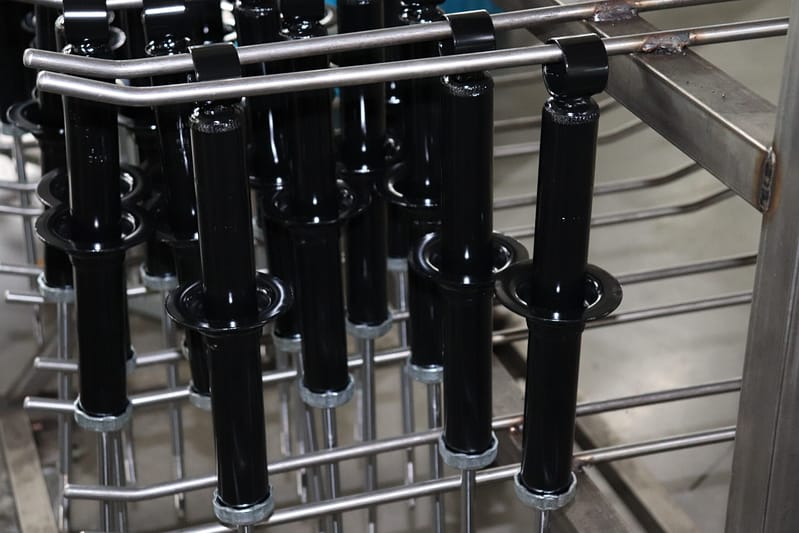Shock absorbers are integral in:
- Managing spring energy post-impact
- Damping oscillations to prevent excessive bounce
- Ensuring smooth ride over varying terrains
- Supporting overall suspension system balance
Enhancing Road Contact
The role of shock absorbers includes:
- Maintaining tire contact during cornering and braking
- Reducing wheel hop on rough surfaces
- Providing traction for controlled acceleration
- Optimizing grip in diverse driving conditions
Improving Vehicle Handling
Shock absorbers contribute to handling by:
- Controlling body roll through corners
- Stabilizing weight transfer during accelerative or braking actions
- Refining steering responsiveness
- Balancing load distribution on the vehicle chassis
How Shock Absorbers Work
Hydraulic Damping Mechanism
Shock absorbers employ hydraulic principles:
- Fluid displacement within the shock body to absorb motion
- Internal piston move through fluid, creating resistance
- Valve controls manage fluid flow and damping rates
- Heat conversion from kinetic energy dissipation
Types of Shock Absorbers
Twin-Tube Shocks
- Dual-cylinder design
- Primary tube and reserve tube
- Suitable for general-purpose use
- Provides smooth, comfortable ride
Mono-Tube Shocks
- Single-cylinder design
- Higher pressure stability
- Provides better heat dissipation
- Suitable for performance applications
Gas-Charged Shocks
- Enhanced damping through gas compression
- Reduction in aeration risks
- Maintains consistent performance over time
- Offers superior handling capabilities
Shock Absorber Effects on Performance
Ride Comfort
Quality shock absorbers ensure:
- Less vibration felt within the cabin
- Minimal impact harshness on uneven surfaces
- Smooth transitions during dynamic maneuvers
- Balanced ride feel for passengers
Handling Precision
By controlling vehicle dynamics, shocks:
- Refine cornering capability with less body roll
- Ensure consistent steering input response
- Improve directional control in adverse conditions
- Enhance driver confidence during aggressive driving
Safety Enhancement
Shocks are crucial in:
- Shortening stopping distances with effective damping
- Mitigating skidding risks in wet or icy conditions
- Preventing suspension bottoming for stability
- Supporting emergency maneuvering with precision
Signs of Shock Absorber Wear
Key Indicators
Worn shock absorbers can manifest as:
- Unusual noises or clunking during driving
- Increased bouncing after passing bumps
- Visible fluid leakage around shock areas
- Uneven tire wear patterns such as cupping
Impact of Neglect
Ignoring shock absorber wear may lead to:
- Reduced braking efficiency
- Compromised vehicle stability
- Accelerated tire wear
- Excess strain on suspension components
Maintenance and Inspection Tips
Regular Inspection Routine
For optimal performance, routinely check:
- Visual condition for leaks and damage
- Performance behavior during drive tests
- Response to bounce test for damping effectiveness
- Ride height variations indicating problem areas
Professional Maintenance Advice
When necessary, consult professionals for:
- Thorough examination using specialized equipment
- Replacement with OEM or upgraded parts
- Alignment checks for associated suspension components
- Periodic servicing to extend lifespan
Conclusion
Understanding the importance and functionality of shock absorbers is fundamental for every vehicle owner interested in maximizing performance and safety. These vital components enhance ride comfort, stabilize handling, and contribute to overall mechanical integrity. Regular maintenance and timely inspections are essential to preserving their functionality and ensuring your vehicle remains a pleasure to drive.
Shock absorbers are much more than simple suspension components; they’re critical to your vehicle’s dynamic behavior and safety features. Keep your vehicle’s shock absorbers in peak condition to enjoy smooth rides, safe travels, and impressive handling capabilities.



